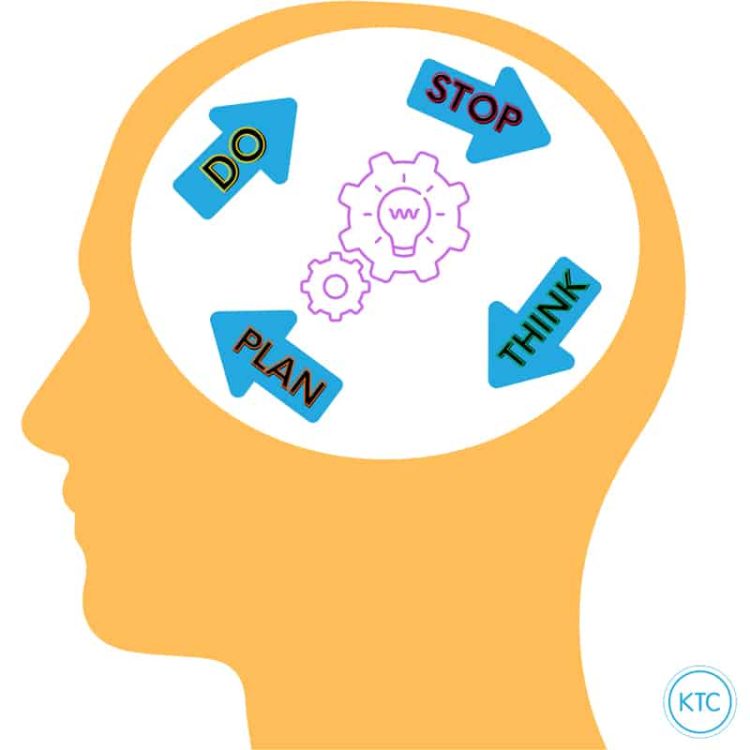Executive Functioning

Executive functioning refers to the major processes that the frontal lobes of our brains complete. These functions or skills are essential for our children to use and develop, as they control three integral areas of processing: Working Memory, Cognitive Flexibility, and Inhibitory (or Self) Control. Executive functioning is also where your child’s development of attention, concentration, organisation, planning, initiating/staying on tasks, and transitioning of focus skills originate.
Breakdown:
Working Memory refers to the ability in which our brains store and draw upon information in a productive manner. These include skills such as remembering the correct way to shower, the steps to dress ourselves, or the correct way to form and handwrite letters and numbers. It also refers to our child’s ability to sequence and process instructions from parents, teachers, and friends. Some children may have difficulty when attempting to remember a sequence of instructions, for example “turn the Xbox off and brush your teeth” (a simple two-step instruction) may be too difficult for them to remember and carry out. Providing a ‘just right’ challenge such as giving one instruction at a time may be more appropriate and draw better results.
Cognitive Flexibility supports us to consider more than one perspective and think about things in multiple ways. We often notice that our children have difficulty dealing with change, becoming upset when something new or different arises. This can be attributed to a lack of conceptualising different views or alternate circumstances. For example, a child has been told that they are going to the beach on Saturday. However, when the weekend rolls around, it is storming, and you are unable to go to the beach. Some children have difficulty understanding that there are alternate factors that contribute to our ability to carry out plans and go to the beach.
Inhibitory (Self) Control encompasses skills such as emotional regulation, sensory processing, and behaviour control. Children with poor self-control, find it challenging to manage impulsive behaviours, such as waiting for their turn to speak or play a game, and have trouble discerning what important or distracting sensory input is. For example, it is difficult for some children to filter out the sounds of the fans/air conditioner in the classroom whilst bring their teachers commands and instructions to the forefront of their mind due to poor sensory processing. Furthermore, it may be difficult for these children to manage their emotions or to simply understand them.
It is important to note that children are not born with any of these skills, they are simply born with the ability to learn and master them. Like all skills, some children become proficient quickly, whilst others take time and effort. Here are some great home activities you can try to support the development of your child’s executive functions.
Working Memory:
- Going on a picnic game
- Categories game (e.g. colours. Each person states a colour until no more colours can be thought of. You cannot repeat colours already said and you must not take more than 10 seconds to think of a new one).
- Sequencing and instruction games on a trampoline (ask the child to complete a simple one step instruction e.g. do 10 star jumps. Grade the tasks up if your child can accurately complete the sequence).
Cognitive Flexibility:
- Station Rotation: Have the child complete a preferred activity for 5 minutes (use a timer that the child can see), then move onto a new activity for 5 minutes and so on. This will support them to learn that sometimes we must stop what we are doing even if we are not finished yet.
- Reading books that allow the reader to choose the path and take turns with a friend / parent in which path to take.
- Introduce fun surprises during the day and give instant rewards (small and sustainable) if they can engage in the activity.
Inhibitory (Self) Control:
- Support a wide variety of sensory play e.g. water play, food play, sand play, pasta play. To support children with sensory processing difficulties, make the environment fun! Do not pressure them into doing anything or get angry if they do not want to. Then, support them and talk through the different senses of the play (smell, touch, sound, sight, taste (if appropriate)).
- Musical statues: This is a great game for children to begin to learn how to control their bodies, starting and stopping to the beat of the music.
- Jenga: Jenga requires self-control to make slow and small movements of your body, it also supports with learning to take turns!
- Mindfulness: In a low stimuli environment (lights dimmed, low noise, natural smells, comfortable and familiar touch) talk through a guided meditation whereby the child tenses (for 15 seconds) each body part, starting at your toes and moving up to your head and face. Talk to your child and tell them that their body is moving SLOW, they appear to be relaxed and calm. By using these words and teaching your child what their body appears to be doing to be relaxed, calm or slow, we can then hope to see improvements and some self-regulation skills when we ask them to relax or calm down.




